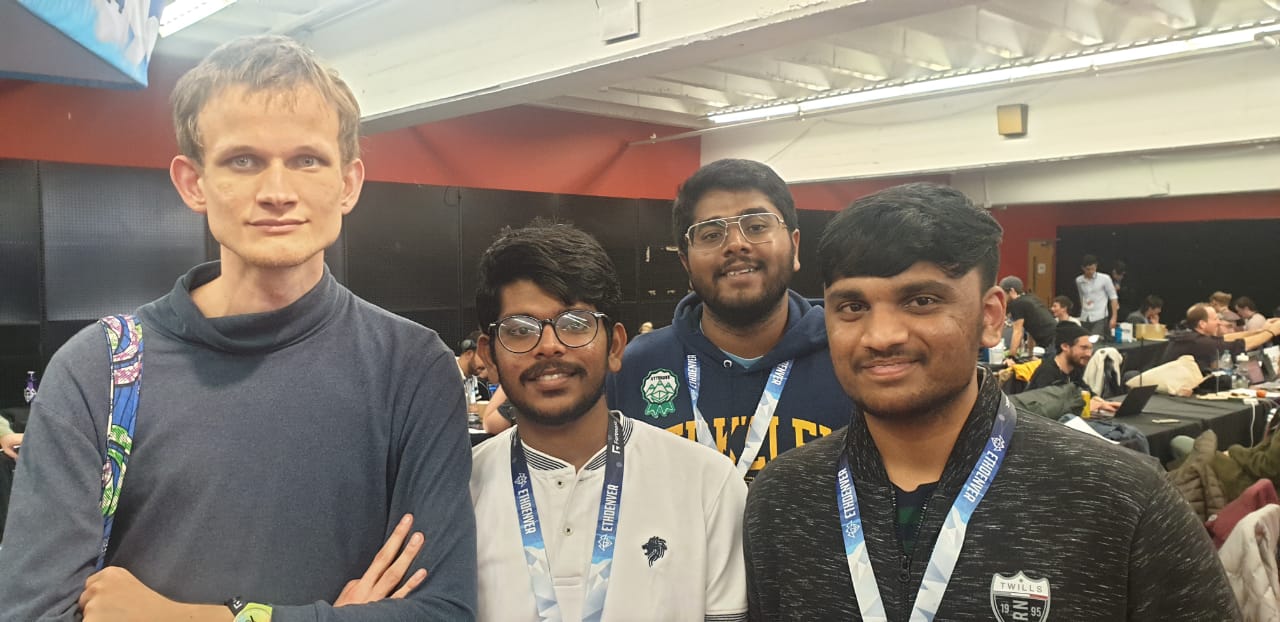AutoNxt Automation visits campus
Interactive session with industrial inventors
 World’s First Electric, Autonomous Tractor
World’s First Electric, Autonomous TractorKaustubh Dhonde, CEO, Swadeep Pillarisetti, Advisor and Board Director, Sachin Gowda, Embedded Engineer, and Aswanth Mulupuri, Intern, Department of Automation of AutoNxt Automation – an innovative Mumbai based startup, visited SRM University AP, Andhra Pradesh for a two-day program as a part of the National Science Day celebration at the campus. The company demonstrated their latest technological marvel, the World’s First Electric, Autonomous Tractor. “A lot of research is conducted globally with multiple companies working on the automation of on-road vehicles. However, off-road vehicles’ automation has hardly been touched upon previously, although there are less variables being controlled environments like farms, industrial plants, etc where it is more feasible a solution”, says Mr. Swadeep who has been advising the company which has brought about a revolutionary breakthrough in the domain of Indian agriculture.
Some of the exceptional features of the Electric Automated Tractor include fully electric drivetrain, low NVH (Noise, Vibration and Harshness) levels, mobile application for interaction with the tractor, live tracking, geo fencing capabilities, battery and system status reports on mobile app, obstacle detection technology and optional automatic hydraulic control of implements. The company is also planning to develop a common charging point that will use free energy sources.
 Students marveling at the automated tractor
Students marveling at the automated tractor
Demonstration by the CEO
AutoNxt Automation has created its niche by offering cost-effective and energy-efficient solutions to farming problems. Mr. Kaustubh believes “It is important that technology reaches out to the entire farmer class”. He further explains the crises of the Indian agricultural system that can be resolved using the Electric Automated Tractors, “The harvesting timeframe is narrow which increases the demand of skilled labour during this season, exponentially enhancing the cumulative cost of farming. The fully automated tractors embedded with camera identification systems and sensors reduce the operational expenses up to 4 times. Also, the IoT sensors give real-time feedbacks ensuring accuracy in tilling, ploughing, and spraying insecticide.”
The representatives of the company held a demonstrative session with the students and faculty on 26th February 2020, where they introduced the tractor and explained its technological viabilities. An interactive session was also held with the students on the same day. The session enabled the students to identify the practical applications of their acquired theoretical knowledge. The entrepreneurs inspired the students to create an impactful change that will eventually benefit society as a whole. Also, it creates an opportunity for them to be closely associated with people from the industry as well as the research domain. On the following day, a presentation was made to the faculty members of SRM AP to trigger discussions on technologies used by the Electric Automated Tractor. In the end, Mr. Kaustubh and Mr. Swadeep expressed their intent to involve students to work on real-time projects with the company, along with taking assistance from the faculty members to overcome hurdles pertaining to AI/ML technologies. Mr. Swadeep says, “The students will be exposed to real case studies, contribute to the improvement of the country, and in the process earn many accolades”.

Sachin Gowda interacting with the students
- Published in Mechanical Engineering NEWS, News
SRM-AP Next Tech Lab Bags Laurels on Blockchain Technology
Prototypes were awarded in ETHDenver International Hackathon
Innovations of SRM University-AP’s Students were acknowledged and rewarded in ETHDenver, an International Conference organised by Ethereum Foundation. Ethereum Foundation is the largest platform for blockchain technology development. In this conference, they arranged for an US Blockchain Technology Hackathon, the biggest challenge on blockchain technology developments and applications. Approximately 2000 students across the world registered for the conference. Students of SRM-AP presented their innovative ideas with prototypes and secured bounty of total $3000 for their projects called URBANBOWL and SECURENOTE. They were also awarded the Community Prize for being on the Top 5. As a part of Global Scholars Programme supported by Ethereum Foundation, the students represented SRM University-AP in the conference.

Urbanbowl partcipants in ETHDenver with Vitalik Buterin, co-founder of Ethereum
URBANBOWL was developed by Koushik Bhargav, Pushyamitra, Srinivas Teja and Rohit, four students of 3rd year, Computer Science and Engineering Department. This project was about making cities self-sustainable by urban farming on rented places. Considering the American societies, where people have unused places like the backyards, the students developed prototype of Urbanbowl, a decentralised urban farming platform where people can lease out empty spaces like backyards or basements. This platform was developed using blockchain technology. Their project also satisfied five UN Sustainable Development Goals (SDG)- End Hunger, Sustainable Cities and Communities, Reduction in Forest Loss and Land Degradation, Climate Action and Sustainable Production Pattern. The students received a bounty of $500 from SKALE and $500 from DAPPHERO for their project.

Securednote participants praised in ETHDenver
SECURENOTE, the second project from SRM-AP, was also highly praised in the conference. Yoganand and Nikhil, 3rd year students of Electronics and Communication Engineering along with Chaitanya and Abhin, 3rd year students of Computer Science and Engineering were the brains behind the project. They have developed a platform where people’s complaints will not go unnoticed. The present scenario in Indian police station shows that people register their complaints manually, and most of the times, those complaints get lost or no action is taken. Using blockchain technology, students of SRM-AP have developed such a platform where such complaints will be registered and digitised in such a way that cannot be modified later without bringing it into notice of all the concerned authorities. This will make the process more secure as none will be able to alter or modify the complaints without notifying the concerned people. They also have received a bounty of $2000 from DAOSTACK for their project.
Click here to view press coverage
- Published in News
Marathon Hackathon win!
Next Tech Lab continue with the winning streak
SRM University AP, Andhra Pradesh equips students to combat adversities and continue to achieve accolades by nurturing their talent and offering them an impetus for growth. Abbas, a third-year CSE student, wins yet another Hackathon at Berkeley. While on his semester abroad program at the University of California, Berkeley, he participated in Hacktech which is Caltech’s premier intercollegiate hackathon. Along with three other team members from Georgia Tech, Virginia Tech, and USC, Abbas competed against 450 hackers who identify and build innovative, technological solutions to solve problems in a variety of disciplines. The team was a finalist in the “Best Overall Hack” and won “Best Hack That Gives People a Voice” by Facebook.
Focusing on “Giving People a Voice”, sponsored by Facebook, Abbas, and team coordinated through Git and voice messaging platforms like Discord and Slack as the Hackathon turned into a virtual competition with the unfortunate outbreak of COVID-19.
SRM AP’s Next Tech Lab team have developed MeetMe, that provides a platform to interact with various people across the globe, irrespective of their background. “MeetMe is a platform that is designed to take the user out of their comfort zone and have them meet people quite different from themselves.”, explains Abbas.
When asked about the intention behind developing such an application, Abbas says, “When pandemics like Coronavirus hit, despite millions being fatally impacted, most people face challenges like Xenophobia causing added fear and damage. We felt that we should do our part to help make the world a better place using technology. We came across UNICEF’s 5 things to do to fight xenophobia. It primarily suggests that connecting people across cultural backgrounds can eliminate prejudices against a certain group, community, or race. Hence, we developed MeetMe.”
The team believes, “MeetMe will encourage people to interact with groups that they are unfamiliar with, which helps them to understand their cultures better, leading to communal harmony and mutual understanding. This could be particularly useful in the wake of catastrophes such as Coronavirus that unfortunately cause incorrect opinions pertaining to certain groups. By providing a platform for these in-person gatherings, we are trying to ensure that the attendees get the chance to interact with people from marginalized communities and reduce undesired emotions that they may harbor consciously or unconsciously towards them.”
- Published in News
Smart Coating Materials to Reduce Thermal Heat Wave
Cost-effective solution to Global Warming
Renowned publishing house Elsevier is publishing Energy Saving Coating Materials-Design, Process, Implementation and Recent Developments (1st Edition), a book edited by Dr Goutam Kumar Dalapati, Associate Professor, Department of Physics, SRM University- AP and Dr Mohit Sharma, Scientist, A*STAR (Agency for Science, Technology and Research), Singapore. The book is about their collaborative research on Thermal Management with the application of coating materials.

Dr Dalapati, Editor of the book
Countries in tropical and temperate belts such as India, Australia, Middle Eastern and African countries receive most of the sunlight. The heat generation is naturally high in these countries. Studies show that the usage of air-conditioner is also very high in these countries to maintain the desired comfort in both home and office spaces. “Air-conditioners need a huge amount of electricity to be operational. Statistics says, globally, out of hundred units of electricity, almost 35-40 units are used for air-conditioning for either heating or cooling purposes. It also has other drawbacks as it generates air-pollutants which aid in global warming. Our Study in the lab of A*STAR shows that even a one-degree change in the air-conditioner’s temperature settings can save a significant amount of electricity. In our study, we have focused on ways of passive cooling, i.e. how the indoor comfort can be maintained without electricity.” Dr Dalapati said.
Dr Dalapati’s book is about developing new materials and process which can effectively reduce temperature inside the buildings. With a vision of having zero-emission buildings in the future, this book focuses on materials, interactions of these materials with sunlight, and then how these materials can be used productively to reduce the temperature in a building, minimising the thermal budget. His team has proposed different type of materials along with different type of techniques. One of those innovative techniques is, Solar Smart Film, which he has a patent for. When applied on the glass, Solar Smart Film is an effective coating material to block the infra-red radiation, which causes the heat, and it allows the visible light only. When applied on concrete, the coating (cool paint) reduces the heat there too. This smart film can reduce the increment of temperature from 2 to 10 degrees centigrade. The usual product available in the market is silver based, hence highly priced. Dr Dalapati’s team has replaced silver-based products with alternative materials like copper or copper-like materials which are cheap in cost, environmentally stable, non-toxic and can be found easily. The process to develop low cost solar films is also explained in his book.
When asked how the idea of publishing a book came to his mind, Dr Dalapati replied, “At first, we published a 100-page article on a similar topic in Progress in Materials Science, a reputed International Review Journal with an Impact Factor of 23.72. Later we thought of publishing a book because whereas an article’s reach is limited within the researchers only, through a book many more people will come to know about our research and its impact on the well-being of the society. It will help in creating a general awareness among common people as well as young minds like high school and college students will be provided with opportunities for brain-storming.”
Dr Dalapati is currently busy in making his product commercially available. He is also developing apparatus for human applications, which will protect the body from thermal heat waves in summer. A patent application has been filed to the Government of India in this regard. In the Future, he also plans to publish further editions of this book where more complex problems will be discussed.

Cover Page of the Book
DETAILS OF THE BOOK:
Book Title: Energy Saving Coating Materials-Design, Process,
Implementation and Recent Developments (1st Edition)
Editors: Goutam Kumar Dalapati and Mohit Sharma
Paperback ISBN: 9780128221037
Publishing House: Elsevier
Published Date: 1st June 2020
Page Count: 368
Language: English
Copyright: © Elsevier 2020
- Published in News

